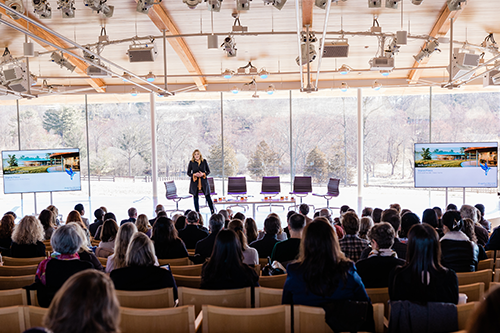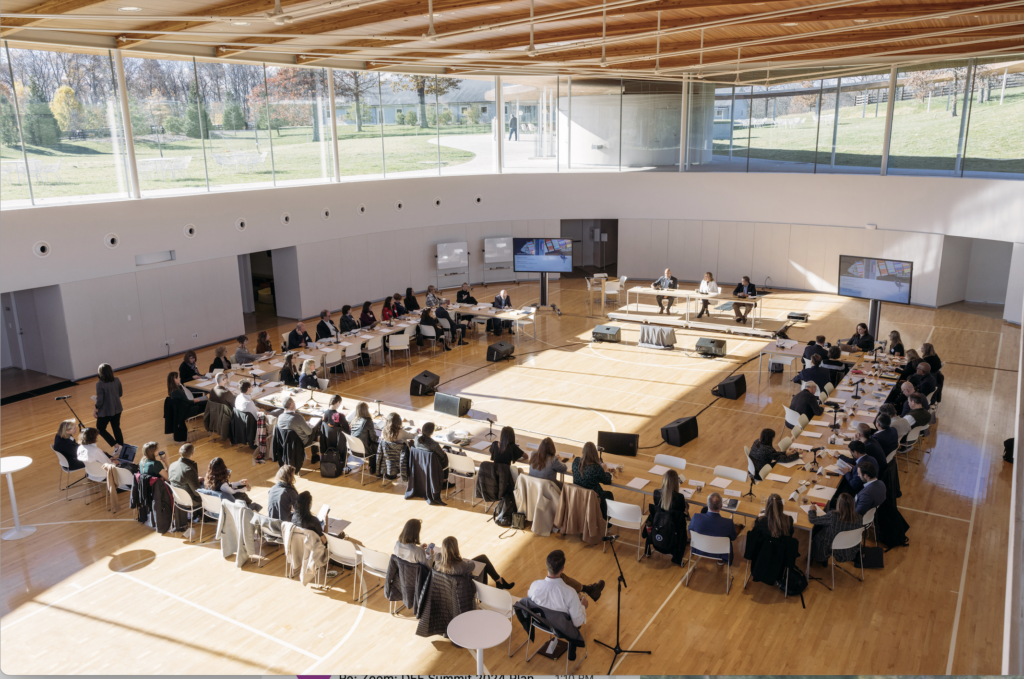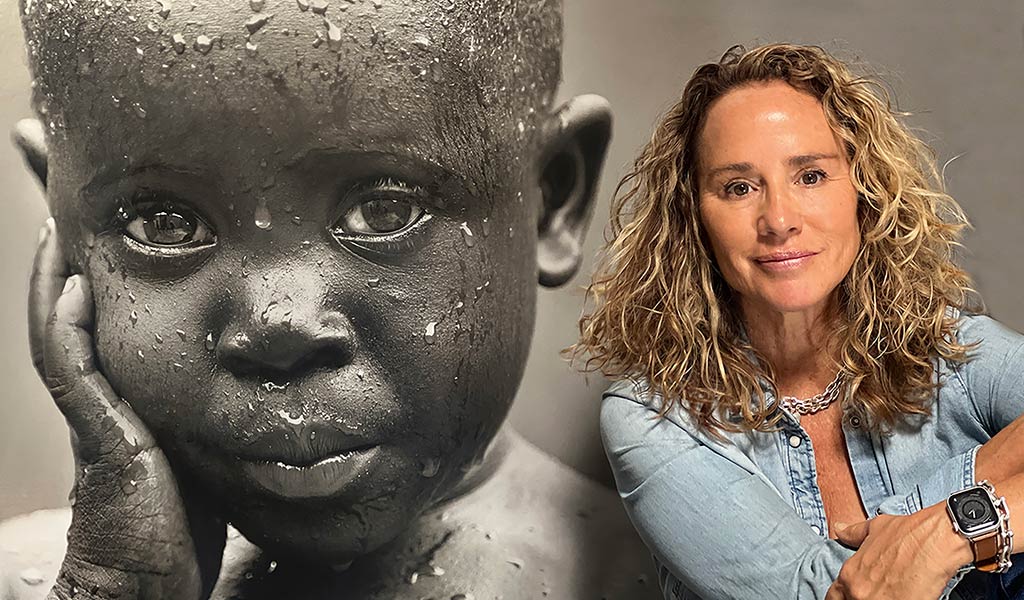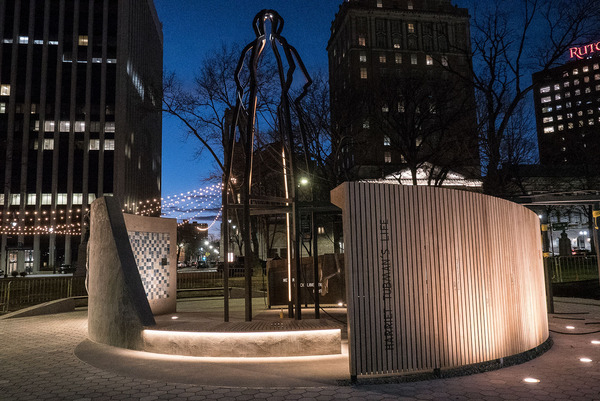Since 2019, more than 25,000 professionals in architecture, engineering, and the construction industry have participated in Design for Freedom convenings and presentations, including thousands of future leaders through collaborations with more than two dozen colleges and universities.
Sharon Prince, CEO and Founder of Grace Farms Foundation, initiated the global Design for Freedom movement to eliminate forced labor in the built environment. Since that launch in October 2020, which included the groundbreaking Design for Freedom Report, and a dedicated website with research, tools, and resources, Grace Farms has accelerated this movement. In the past three years, we have released the Design for Freedom Toolkit, a comprehensive resource for prioritizing ethical procurement, initialized eight global Pilot Projects across three continents to demonstrate designing without forced labor is possible, and held the first-ever Design for Freedom Ethical Supply Chain Workshop with Turner Construction and the U.S. Department of State’s Bureau of Overseas Buildings Operations (OBO).

Grace Farms CEO and Founder Sharon Prince welcomes hundreds of attendees to the 2023 Design for Freedom Summit. Credit: Jacek Dolata
“We are not just in agreement that forced labor in the building materials supply chain is unethical and immoral. We are in agreement that now is the time for action and true market transformation to design and build more humanely.” — Sharon Prince
Convened at Grace Farms, the workshop welcomed over 80 government officials, the industry’s largest manufacturers, and leading technology partners to discuss increasing transparency in the supply chain. Grace Farms will publish the outcomes in a report that will be released at the 2024 Summit.

The first-ever Design for Freedom Ethical Supply Chain Workshop with Turner Construction and the U.S. Department of State’s Bureau of Overseas Buildings Operations (OBO). The workshop was held in Grace Farms’ subterranean Court.
This year, we again expect over 500 industry leaders across the eco-system of the built environment to participate in the Design for Freedom Summit on March 26. Some of the themes or topics that will be addressed include Ethical Decarbonization, Just Transition, Navigating Interior Sourcing in Pilot Projects, Supply Chain Mapping Technology, Adapting for Climate Futures, Adapting for Climate Futures, and The Financial Case Against Forced Labor. Experts from various fields, who are actively working to eradicate forced and child labor from the built environment, will be speaking during the Summit, as well as participating in roundtable discussions.
Highlights of this year’s Summit include the opening address by Sharon Prince and featured presentations from Lisa Kristine, Humanitarian Photographer & Activist; Founder of Human Thread, and Nasreen Sheikh, Modern Slavery Survivor, Visionary Leader, Author, Founder of the Empowerment Collective Foundation.
Dignity Inherent in Every Individual
As a humanitarian photographer, Kristine’s works captures the dignity inherent in every individual.
“The work is really an invitation for all people to come together, for all of us to see one another … life isn’t just about ourselves.” — Lisa Kristine
Her work has documented the wisdom of indigenous communities, as well as the men, women, and children trapped in modern slavery. Kristine has the unique ability to bring the observer into the inconceivable existence of nearly 28 million people laboring under forced labor conditions, according to the International Labour Organization. In her photography and public speaking events (UN, Parliament, Davos, and Ted Talks), Kristine exposes the deeply human stories to increase global awareness and serve as a catalyst for social change. Kristine is the subject of four documentaries, and her work on slavery is featured in three films including the feature film SOLD, made by Oscar award-winning team Emma Thompson and Jeffrey Brown.

Lisa Kristine’s work will be featured in the 2024 With Every Fiber exhibit at Grace Farms, curated by Chelsea Thatcher, Founding Creative Director, Grace Farms Foundation. An announcement will be make about the exhibit at the Summit. Photo: Lisa Kristine
Survivor of Modern Slavery
Just as Kristine’s work invites us to see one another, Nareen Sheikh’s personal story as a survivor of modern slavery, illuminates the complexity of modern slavey and why it remains so hidden. Her work not only empowers other survivors of modern slavery, but emphasis the necessity for a transparent global economic system, supply chain transparency, corporate engagement, and more legislation to end modern slavery.
Nasreen Sheikh is a survivor of modern slavery and a visionary leader committed to ending modern slavery through survivor-led initiatives. Her profound journey is interwoven with her roles as the founder of the Empowerment Collective nonprofit organization, an organization dedicated to ending modern slavery, and Local Women’s Handicrafts (LWH), a women’s social business venture in Nepal. Her emphasis on a transparent global economic system, supply chain transparency, corporate engagement, and modern slavery legislation are important steps toward ending modern slavery.
A 2023 CNN Freedom Project story provides insights into Sheikh’s life, where as a child, she worked “up to 20 hours a day in a sweatshop in Nepal stitching fabric that would become clothes sold to consumers unaware of their true cost.” As she walks down the streets today, Sheikh says she still see the suffering embedded in people’s clothes.
“Ninety percent of my brain, all the time, still lives in those experiences,” she said. “It’s hard not to be there.” — Nasreen Sheikh
The embedded suffering of modern slavery extends beyond our clothes. Whether it’s food, shelter, cars, electronics, and more, there’s a significant likelihood – unless producers are consistently rigorous about eliminating forced labor in the extraction and manufacturing process – consumer and commercial products are intertwined with modern slavery. Prince address embedded suffering in her essay Embodied Suffering in Our Building Materials in a collection of essays in the International Living Future Institute’s book, The Regenerative Materials Movement: Dispatches from Practitioners, Researchers, and Advocates. She is featured alongside leaders in their fields from organizations such as Google, JPB Foundation, MASS Design, Harvard University, Buro Happold, and mindful Materials.
“We can no longer accept the slavery discount.” – Sharon Prince
With the emergence of new anti-slavery laws around the world, including the Uyghur Forced Labor Prevention Act (UFLPA), which ensures that goods made with forced labor in the Xinjiang Uyghur Autonomous Region of the People’s Republic of China do not enter the United States, organizations are becoming more aware of the reputational and financial risks. These risks we have addressed since our first Design for Freedom Summit in 2022, including our most recent Design for Freedom Ethical Supply Chain Workshop in 2023.
In this year’s Summit, we’ll continue to address how Design for Freedom and its more than 100 Working Group partners, are making advancements with supply chain transparency through technology, Design for Freedom Pilot Projects, and using finance as a lever to accelerate industry-wide change. There is also a convergence of crises that will make forced labor harder to ignore. As the climate crisis and political conflicts become more pronounced, displacing already marginalized people around the world, millions will become even more susceptible of falling into forced labor situations with false employment promises.

In March 2023, United States Artists Fellow, architect, and artist Nina Cooke John unveiled Shadow of a Face to the public. The Harriet Tubman Monument encourages visitors to connect with Harriet Tubman, her story, and her extraordinary legacy. Design for Freedom worked with Cooke John on the transparent sourcing of materials for the monument, demonstrating her commitment to design and build with materials that are free of forced labor. Cooke John is currently working on the Design for Freedom exhibition, With Every Fiber, opening in May 2024. Photo credit, Cesar Melgar
Ethical Decarbonization
The construction industry, which is one of the largest industrialized sectors at the highest risk of forced and child labor, is positioned to address this convergence of climate change and forced labor together through ‘Ethical Decarbonization.’ This is the first time that embedded suffering of forced labor in the building materials supply chain has been linked to the climate crisis. As the industry considers reusing building materials, as well as bio-based materials, it can accelerate the elimination forced labor.
“This is a rare and promising time to initialize ‘ethical decarbonization’ to assess and lower both embodied carbon and embodied suffering in an opaque weighty marketplace that will have significant humanitarian impact.” – Sharon Prince, Yale Club
We welcome all leaders to join us on this impactful day as we work to eliminate forced labor from the built environment.
Design for Freedom Summit Agenda
Welcome Address
Sharon Prince, CEO & Founder, Grace Farms
10:15am
Opening Presentations
Featured speaker
Lisa Kristine, Humanitarian Photographer & Activist; Founder of Human Thread
Ethical Decarbonization
- Kai-Uwe Bergmann, Partner, BIG
- Fiona Cousins, Director, Americas Chair, Arup
- Kimberly Randle, CEO & Founder, FairSupply
- Moderated by Sharon Prince, CEO & Founder, Grace Farms
11:30am
Morning Break
11:50am
Realizing the Just Transition
- Leonardo Bonanni, CEO & Founder, Sourcemap
- Tim Conway, VP Sustainability, Shaw Industries
- Renata Parras, ESG Counsel, Paul Hastings
- Moderated by Nora Rizzo, Ethical Materials Director, Grace Farms
12:30pm
Lunch, Architectural Tours, and Nature Walk
- Kimberly Kelly, Director of Horticulture, Grace Farms
- Toshihiro Oki, Architecture Advisor, Grace Farms
1:45pm
Breakout Sessions | Roundtables, Conversations, and Presentations
Inside Out | Navigating Interior Sourcing in Pilot Projects
- Jane Abernethy, CSO, Humanscale
- Chloe Bendistis, Assistant Director Sustainability Practice, The Sheward Partnership
- Tim Conway, VP Sustainability, Shaw Industries
- Jessica Murray, Interior Designer, Cushing Terrell
- Hayes Slade, Founding Partner, Slade Architecture
Insights from the Harriet Tubman Monument Pilot Project
- Nina Cooke John, Principal, Studio Cooke John
- Ed Bartholomew, Principal, Bartholomew Lighting
- Jamie Devenger, Chief Innovation Officer, Q-Tran
- Chelsea Thatcher, Chief Strategy Officer & Creative Director, Grace Farms
University Forum
- Sarah Billington, Chair and UPS Foundation Professor
of Civil & Environmental Engineering, Stanford - Dr. Michael Crosbie, Critic and Professor of Architecture, University of Hartford
- Karen Kariuki, Senior Program Officer, Grace Farms
- Patricia Saldaña Natke, Founding Partner, UrbanWorks; Adjunct Professor, Illinois Institute of Technology College of Architecture; Teaching Assistant Professor at UIUC School of Architecture.
- James Slade, Founding Partner, Slade Architecture; Visiting Professor, School of Architecture, Pratt Institute
Meet the Material Experts
- Annie Bevan, CEO, mindful MATERIALS
- Luke Johnson, Sustainability Specialist, Nucor
- James Kitchin, Director of Engineering and Performance & Provenance, MASS Design Group
- Amy Musanti, Director of Sustainable Building Solutions,
ASSA ABLOY - Fernanda Pedroso, CMO, Polycor
- Jonsara Ruth, Co-Founder & Design Director, Healthy Materials Lab
Supply Chain Mapping Technology
- Leonardo Bonanni, Founder and CEO, Sourcemap
- Jared Gilbert, Associate Partner, COOKFOX
- Shawn MacDonald, CEO, Verité
- Kimberly Randle, CEO & Founder, FairSupply
- Raphael Sperry, Associate Principal, Arup
Adapting for Climate Futures
- Dr. Christine J. Kirchhoff, Associate Professor, Penn State
- Dr. Timon McPhearson, Professor of Urban Ecology and Director of the Urban Systems Lab, The New School
- Annabel Short, Founder, It’s Material
From Proposal to Practice | Navigating to ‘Yes’
- Jennifer Downey, Director, ESG, Turner Construction
- Steven Garcia, Associate Principal, SHoP
- Leslie King, Attorney at Law, Construction, Carlton Fields
- Nat Oppenheimer, Senior Principal, TYLin | Silman Structural Solutions
- Ann Rolland, Partner, FXCollaborative
- Claire Weisz, Founding Principal, WXY architecture + urban design
3:15pm
Grace Farms Foods
Adam Thatcher, CEO & Co-Founder
3:25pm
The Financial Case Against Forced Labor
- Preeti Bhattacharji, Head of Sustainable Investing, JP Morgan Chase
- Maha Khan, Financial Sector Lead, Financing Against Slavery & Trafficking, United Nations University
- Dave Wildman, Global Head Facilities, Sustainability Ops, and MEP Infrastructure, Bloomberg
- Moderated by Karen Kariuki, Senior Program Officer, Grace Farms
4:05pm
Featured Speaker
Nasreen Sheikh, Modern Slavery Survivor, Visionary Leader, Author, Founder of the Empowerment Collective Foundation
4:30pm
Pilot Project Announcements, With Every Fiber Exhibit, Closing Remarks
4:45pm
Cocktail Reception
To register: Design for Freedom
Download the Design for Freedom agenda
AIA CES Approved 4 LU | HSW
SARA CES Approved 4 LU | HSW

